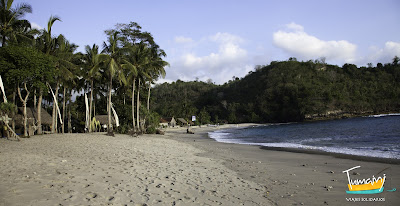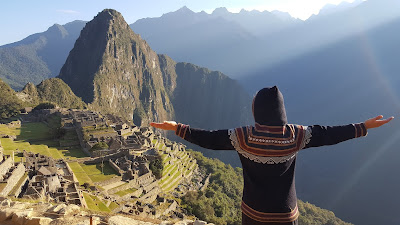Responsible traveler's kit I: how not to harm the environment when we travel?
| A volunteer from Peru project, on the way to Machu Picchu. |
We have all experienced it: we are going to visit a monument, but it is overcrowded and deteriorated. We trek through the Himalayas, but on the way we found waste. We dive on an island in Thailand, but there are so many tourists that there are hardly any corals. Every year, more than a billion people travel the world, and their travels often harm the environment. This is where our responsible traveler kit begins. First chapter: tips to minimize our impacts when we travel!
1 Deterioration of cultural spaces
Until very recently, there were no limits to visiting archaeological sites, monuments and other enclaves. Machu Picchu, the Taj Mahal or the Colosseum in Rome itself received thousands and thousands of tourists every day. This has caused their deterioration and has worsened the experience of the people who visit them. Luckily, in many of them a maximum number of people who can visit them per day (the so-called “carrying capacity”) has been established, visiting shifts have been established, etc.
What can I do?
As a traveler, you can do a lot to avoid this deterioration of heritage:
- Find the days with less crowd to visit monuments.
- Yes you can, travel out of high season. The prices are cheaper and the crowd is much less.
- If you visit a monument and it is overcrowded or deteriorated, make a complaint or suggestion explaining the situation.
- Be sympathetic or sympathetic if you visit a place and it is closed Totally or partially. Rehabilitation is essential to preserve heritage. Take the opportunity to visit lesser-known places that will surely surprise you.
- Never never! leave waste.
- Complies with rules of the place: if photos cannot be taken or there are spaces that cannot be visited, it is for the good of the monument.
 |
| Responsible tourism in Agra, near the varanasi project with which we collaborate. |
2 Deterioration of natural spaces
There are many effects that we unintentionally produce when we travel irresponsibly: soil erosion, increase in pollution, dumping of waste into the sea, loss of natural habitats and pressure on endangered species.
There are governments that are already taking action. Thailand closed the island of Koh Tachai in 2016 to tourism to protect the corals, flora and fauna of one of the favorite destinations for diving
What can I do?
Your attitude is key to avoiding the deterioration of the natural spaces you visit:
- do not stay in beachfront.
- Don't stay in a large hotel complex where the cost of light, water and energy is excessive.
- You also limit your consumption. Don't let there be sky-high air conditioners. If it happens to you, please ask them to download it.
- find out about recycling system of the country you visit. If, for example, you bring batteries and you don't have the country does not have a system to recycle them, take them back home.
- Never never! leave waste.
- If you are going to do any activity with animalsThey make sure they are treated with dignity. Visit a wildlife rescue center or an elephant sanctuary, for example. Also, do not invade their space, do not make too much noise and follow the instructions they give you.
- if you do a trekking, do not leave the established routes.
 |
| In India, the volunteers are involved in cleaning the mountains. |
3 Carbon Footprint
It is the indicator that measures the amount of greenhouse gases that we emit when carrying out a certain activity. One of the most harmful gases is CO2. He aviation industry it is responsible for 2% of the CO2 emission generated by the human being. An exorbitant number.
There are governments, such as that of Costa Rica, and companies such as KLM, which are investigating the use of biofuels as an alternative energy source and sustainable. The European Union is also trying to regulate emissions, but the measures will be put in place in a few years.
What can I do?
- Avoid taking unnecessary flights. Instead of taking internal flights and traversing North and South India in three weeks, focus on one area or get around by bus. Think that it is impossible for you to see everything. Plus, that way you have an excuse to come back.
- Offset your emissions. Many airlines give travelers the option of offsetting the CO2 that their flight will emit. For example, at the time of purchase, they give the option of donating an amount of money to environmental projects to "offset" the impact of the flight.
There are numerous “CO2 calculators" In Internet. With them you can calculate not only the CO2 that you produce with your plane trips: also the one that you emit when you go by car, bus, when you turn on the heating, etc. Once calculated, you can offset your emission by making a donation to a project.
 |
| In Bali, we collaborate with an environmental protection project. |
4 Poor water management
Resorts, golf courses, swimming pools, large hotels, showers on the beaches... consume an inordinate amount of water. So much, that it begins to link tourism development to drought hazard. Mallorca, for example, is in a pre-drought situation and it is believed that a large part of it is caused by tourism. Because, according to the municipal government, tourists consume more than twice as much water as residents.
What can I do?
- Even if you are "relaxing", do not lengthen your showers, do not shower several times a day. Consume the necessary minimum of water.
- Don't leave the beach showers nor any faucet in operation, if you do not use them.
- Neither let your sons or daughters play wasting this resource (turning on the showers, using water guns, etc.). They must understand from a young age that it is a very valuable asset 🙂
- Don't wash the towels every day, if not necessary.
- Choose accommodations that they reuse the water and promise not to waste it.
 |
| Machu Picchu has limited the maximum number of daily visits to 6,000. |
Year of Sustainable Tourism
Remember that 2017 is the International Year of Sustainable Tourism for Development, so now, more than ever, we must be aware that our actions as travelers are powerful!
Travels. Enjoy. But also: respect.




Wilmary Villarroel
There is no doubt about the growing awareness that has been taking place in society in terms of ecology in recent years. Respect for the natural environment has already become one of the main concerns of a large number of activity sectors, as in the case of the tourism sector, now highly aware of the importance of caring for resources and habitats after decades of wear and tear in many areas of the planet. Greetings.
Source: galapagos yacht cruise